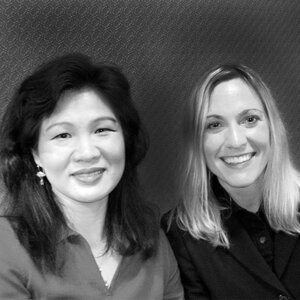EUN-JA KANG
Eun-Ja Kang is the first writer of Korean origin to write in French. She left Seoul, South Korea for France after obtaining a university degree with a major in French. She arrived in Lyon in 1989 at the age of twenty-two and completed a masters degree in French two years later. She went on to pursue a doctorate in French and comparative literature that she defended in 2002, the same year that she submitted a novel for a literary competition organized by the Cino Del Duca Foundation. This award enabled her first book to go to print in 2003 under the title Le Bonze et la femme transie. In 2005, her second novel, Les Promis, was published, and in 2013, the autobiographical L’Étrangère received a prize from the Académie française for its contribution to French language and literature.
Eun-Ja Kang est le premier écrivain d’origine coréenne à écrire en français. Elle a quitté Séoul, en Corée du Sud, pour s’installer en France après avoir obtenu un diplôme universitaire avec une spécialisation en français dans son pays natal. Elle est arrivée à Lyon en 1989 à l’âge de vingt-deux ans et a obtenu un master en lettres deux ans plus tard. Elle a soutenu sa thèse de doctorat en littérature française et comparée en 2002, l’année même où elle a terminé un roman qui a reçu le prix décerné par la fondation Simone et Cino Del Duca, qui a rendu possible sa publication en 2003 sous le titre Le Bonze et la femme transie. En 2005 paraît son deuxième roman, Les Promis, suivi en 2013 d’un troisième ouvrage autobiographique intitulé L’Étrangère, qui a reçu un prix de l’Académie Française pour sa contribution à la langue et à la littérature françaises.
Eun-Ja Kang took the train to Paris from her home in Dijon for our interview, which took place the 7th of January 2006 in the restaurant Le Train bleu in the Gare de Lyon; she has since taken up residence in the French capital city.
Eun-Ja Kang a pris le train de Dijon à Paris pour notre entretien, qui a eu lieu le 7 janvier 2006 au restaurant Le Train bleu à la Gare de Lyon ; aujourd’hui elle habite la capitale française.

